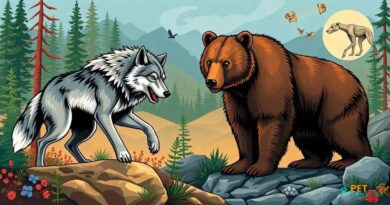O que é Canis lupus familiaris
What is Canis lupus familiaris?
Canis lupus familiaris, commonly known as the domestic dog, is a subspecies of the gray wolf and is one of the first domesticated animals. This fascinating creature has been a loyal companion to humans for thousands of years, serving various roles from hunting partners to beloved pets. The domestication of dogs is believed to have occurred between 20,000 and 40,000 years ago, marking a significant milestone in human history.
Amazing Deals on Dog Products!
Shop now for incredible deals on dog products at Amazon.com.
LEARN MORE
Origins and Evolution of Canis lupus familiaris
The evolutionary journey of Canis lupus familiaris is a captivating tale of adaptation and survival. Genetic studies suggest that dogs descended from wolves, with early humans selectively breeding them for specific traits such as temperament, size, and behavior. Over time, this led to the vast diversity of dog breeds we see today, each with unique characteristics suited for different tasks and environments.
Physical Characteristics of Canis lupus familiaris
Canis lupus familiaris exhibits a remarkable range of physical characteristics, influenced by selective breeding. From the tiny Chihuahua to the massive Great Dane, dogs come in various sizes, shapes, and colors. Their physical traits, including coat type, ear shape, and tail length, vary significantly among breeds, showcasing the incredible adaptability of this species to human needs and preferences.
Behavioral Traits of Canis lupus familiaris
Behaviorally, Canis lupus familiaris is known for its loyalty, intelligence, and social nature. Dogs are pack animals by instinct, which makes them highly social and eager to form bonds with humans and other animals. Their ability to understand human emotions and commands has made them invaluable companions, service animals, and working dogs in various fields, including therapy, search and rescue, and law enforcement.
Roles of Canis lupus familiaris in Human Society
The roles of Canis lupus familiaris in human society are diverse and multifaceted. Beyond companionship, dogs have been utilized for hunting, herding livestock, guarding property, and even assisting individuals with disabilities. Their keen senses and trainability have made them essential partners in various professional fields, enhancing human capabilities and enriching lives.
Health and Care of Canis lupus familiaris
Caring for Canis lupus familiaris involves understanding their specific health needs, which can vary widely among different breeds. Regular veterinary check-ups, vaccinations, and a balanced diet are crucial for maintaining their health. Additionally, mental stimulation and physical exercise are essential to prevent behavioral issues and ensure a happy, fulfilling life for these beloved pets.
Training Canis lupus familiaris
Training is a vital aspect of responsible dog ownership. Canis lupus familiaris responds well to positive reinforcement techniques, which encourage desired behaviors through rewards. Early socialization and obedience training can help prevent behavioral problems and ensure that dogs are well-adjusted members of society. Consistency and patience are key elements in successfully training a dog.
Common Breeds of Canis lupus familiaris
There are hundreds of recognized breeds of Canis lupus familiaris, each with its own unique traits and characteristics. Popular breeds include the Labrador Retriever, German Shepherd, Golden Retriever, and Bulldog, among others. Each breed has been developed for specific purposes, whether for companionship, work, or sport, showcasing the incredible versatility of dogs as a species.
The Importance of Canis lupus familiaris in Culture
Canis lupus familiaris holds a significant place in human culture, symbolizing loyalty, protection, and companionship. Throughout history, dogs have been featured in art, literature, and folklore, often representing the bond between humans and animals. Their presence in our lives has inspired countless stories, movies, and traditions, further solidifying their status as cherished members of our families.
Future of Canis lupus familiaris
The future of Canis lupus familiaris is bright, with ongoing research into their genetics, behavior, and health. As our understanding of these animals deepens, we can better cater to their needs and enhance the human-dog relationship. With advancements in veterinary care and training methods, the bond between humans and Canis lupus familiaris will continue to thrive, ensuring that these remarkable companions remain an integral part of our lives.



